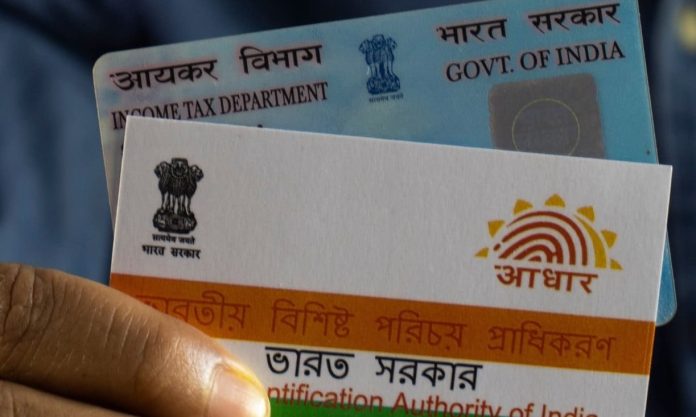


The Indian government has recently blocked access to certain websites that exposed personal details such as Aadhaar and PAN numbers. This move has sparked controversy and raised concerns about the security of personal information in India. The government has not provided a reason for the blockage, but it is believed to be in the interest of protecting citizens' data. Prime Minister Narendra Modi's administration has been pushing for the digitization of various services, but this incident has raised questions about the safety and privacy of such systems.
Blocking of Websites Exposing Personal Information in India: Implications and Concerns
The Indian government's recent decision to block access to websites that exposed personal details, including Aadhaar and PAN numbers, has sparked controversy and raised concerns about data security. This move has brought to the forefront the issue of balancing personal privacy and national security in the digital age.
Background
Aadhaar is a unique identification number assigned to Indian citizens. It has been promoted by the government as a means to streamline various services, including financial transactions, healthcare, and subsidies. However, concerns have been raised about the potential misuse of this sensitive data.
PAN (Permanent Account Number) is a 10-digit alphanumeric identifier issued by the Income Tax Department of India. It is used for tax-related transactions.
Government's Action
On April 8, 2023, the Ministry of Electronics and Information Technology (MeitY) issued an order blocking access to multiple websites that were alleged to be illegally disclosing Aadhaar and PAN numbers. The government's move followed a breach in a government database that exposed the personal information of millions of citizens.
Controversy and Concerns
The government's decision has sparked controversy. Privacy advocates have expressed concerns about the lack of due process and transparency in the blocking of websites. They argue that it sets a dangerous precedent and could lead to the censorship of legitimate information.
Furthermore, the blocking of websites has raised concerns about the security of personal information in India. The breach in the government database highlights the vulnerability of sensitive data and the need for stronger measures to protect it.
Top 5 FAQs
1. Why has the government blocked these websites? The government has not provided a specific reason for the blockage, but it is believed to be in the interest of protecting citizens' data.
2. Which websites have been blocked? Multiple websites have been blocked, including Online PAN India, PAN Card Status Verify, and Aadhaar Data Verify.
3. Can I still access my Aadhaar and PAN details? Yes, you can still access your Aadhaar and PAN details through official government websites or authorized channels.
4. What should I do if I suspect my personal information has been leaked? If you suspect that your personal information has been leaked, it is advisable to contact the UIDAI (Unique Identification Authority of India) or the Income Tax Department and report the incident.
5. What is the government doing to protect personal data? The government has recently introduced the Personal Data Protection Bill, which aims to provide a framework for protecting the personal data of Indian citizens. The bill is still under review.
Conclusion
The Indian government's blocking of websites exposing personal information has raised significant concerns about data security and privacy. It is crucial for the government to strike a balance between protecting citizens' data and ensuring freedom of information. The upcoming Personal Data Protection Bill is an important step in this direction, but its effective implementation will be key to safeguarding the privacy of Indian citizens in the digital age.

The Text With Jesus app, powered by OpenAI's ChatGPT, has gained popularity since its launch, despite skeptics calling it blasphemy. Users can engage in AI-generated conversations with famous Biblical figures like Jesus and Moses, receiving scripture-based advice on various topics. Creator Stéphane Peter shares that most users have come to the app out of curiosity and are embracing the unique experience.

With the demand for fast, secure, and reliable connectivity in the Industry 4.0 era, private 5G networks are emerging as a game changer. Leading this charge is telecom innovator Rahul Bangera, who has extensive experience in integrating industrial networks with core business systems. By making technology invisible and enabling real-time data flow, his solutions are improving efficiency, safety, and decision-making in manufacturing sites. Additionally, he has addressed workforce readiness and cybersecurity hurdles with comprehensive managed services. As the industry heads towards the convergence of secure connectivity, edge computing, and AI, the potential for self-optimizing, intelligent factories is endless.

In a major partnership, Google and Reliance have announced that they will provide Jio users with free access to Google's AI Pro plan, powered by the latest Gemini 2.5 Pro model. This offer, generally worth Rs 35,100, will give eligible users access to enhanced AI image and video generation capabilities, along with increased storage and productivity tools. Additionally, Google Cloud will serve as Reliance Intelligence's strategic AI infrastructure partner, empowering Indian companies to adopt Gemini Enterprise and build complex and capable AI applications domestically.

Google has teamed up with Reliance Intelligence to offer its top-tier AI Pro plan, featuring the latest Gemini 2.5 Pro model, to Jio Unlimited 5G subscribers for 18 months at no additional cost. The collaboration aims to expand access to advanced AI tools for millions of users in India, with an initial rollout to 18-25 year olds before expanding nationwide. Along with Gemini Pro, the plan will also provide higher limits for generating images and videos, expanded access to NotebookLM, and 2 TB of cloud storage. The move reflects a growing trend among telecom providers to bundle premium AI products into their mobile plans, following in the footsteps of Airtel and OpenAI.

Thousands of users worldwide are unable to access critical services such as Azure, Microsoft 365, Teams, Outlook, and the Microsoft Store due to widespread downtime across several of Microsoft's key platforms. The outage has also affected major corporate clients like Starbucks, Kroger, and Costco, highlighting the extent of the problem. While Microsoft has acknowledged the issue and is working on a solution, frustrated users have taken to social media to express their displeasure and even poke fun at the situation.

Elon Musk has once again stirred the tech world with the launch of Grokipedia, his version of Wikipedia, powered by AI. With its first iteration already live, Musk claims that Grokipedia 0.1 is superior to Wikipedia, and version 1.0 will be a whopping 10 times better. As this new platform takes on the task of compiling and updating information with the help of AI, we explore the key differences between Wikipedia and Grokipedia.

Gone are the days of standing in long queues to update your Aadhaar card. With the new rule, you can now make any changes or corrections to your Aadhaar information online, without having to visit an enrolment centre. This means that updating your name, address, date of birth, or mobile number will be faster, simpler, and more secure than ever before. Say goodbye to the hassle and hello to convenience with this game-changing update to the Aadhaar system!

Entrepreneur and inventor Elon Musk has launched a new online encyclopedia called Grokipedia, which he claims will provide a more balanced and unbiased view of controversial subjects compared to Wikipedia. Although some entries on the site appear identical to those on Wikipedia, many users have praised Grokipedia for its nuanced and detail-oriented approach. However, others remain skeptical and have pointed out that some pages on Grokipedia appear to have been lifted directly from Wikipedia without proper credit. Nonetheless, Musk has emphasized that his goal with Grokipedia is to provide "the truth, the whole truth, and nothing but the truth."

During a meeting with Indian Police Service probationers, President Droupadi Murmu emphasized the importance of technology in policing and the potential threat of "digital arrest". Murmu stated that India's economic growth relies on effective policing for maintaining law and order and attracting investment. She also highlighted the role of a future-ready police force, led by young officers, in shaping a technologically-advanced 'Viksit Bharat'. "Digital arrest" refers to a scam where fraudsters pose as law enforcement officials and use threats of arrest and other means to extort money from victims.

South African entrepreneur Elon Musk's social media platform X, formerly known as Twitter, has announced that it will no longer use the Twitter domain for two-factor authentication. This update primarily affects users who utilize hardware security keys or passkeys and they must re-enroll their credentials on X.com before November 10 to avoid being locked out of their accounts. This move reflects Musk's long-standing ambition to revitalize the X.com brand, which he founded in 1999 and later merged with Confinity to create PayPal.